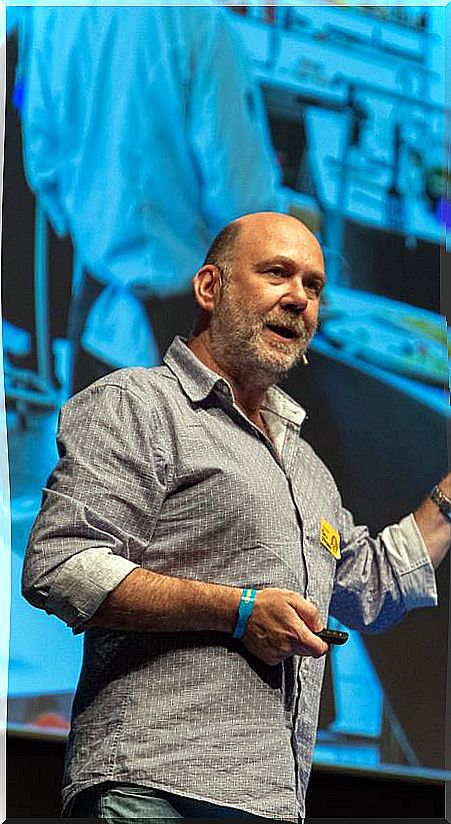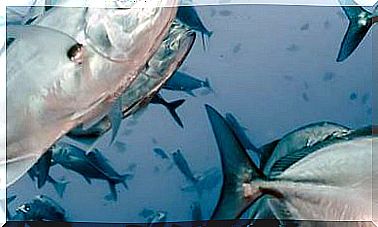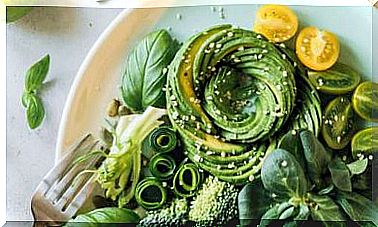Kitchen Experts Who Are Changing The World
The Fixing the Future conference brought together food professionals in Barcelona who promote innovative projects with social impact.

They define themselves as a small but optimistic team. At Atlas for the Future they know that there is a climate crisis, that the problem of plastic waste is serious and that the planet is scarce in water and lacks food. However, they prefer to focus on the people who work for a better future and on innovative projects with a social impact. They publish articles and videos about them on their digital platform.
Atlas for the Future also promotes, from Barcelona, the Fixing the Future conference, the second edition of which was held on June 7 and 8 at the CCCB in Barcelona. More than 40 people from around the world explained what they are doing for biodiversity, oceans, food production, cities and climate change.
Abby Rose, for example, helps small farmers go greener and increase their profits through her Farmerama radio podcasts. Miquel Ballester is a circular innovation leader at Fairphone (the Netherlands) and works so that mobiles do not have such a short life. Kirsty Scheneeberger from ClientEarth (UK) is fighting climate change from a legal point of view, with the help of legislation.
But representatives of large companies such as Danone or Aigües de Barcelona were also there, aware that they can (and should) be agents of social change. “Things have to be done together and companies have something to say, ” said Maria Salamero, director of Sustainability Strategy and Communication at Aigües de Barcelona.
Eat again with the senses
Within the thematic block dedicated to how we eat, the multi-award winning and expressive Scottish chef Jock Zonfrillo spoke in the first place , recovering ingredients originating from Australia in his Orana restaurant in Adelaide.
He was exposing his will to preserve indigenous knowledge through the Orana foundation that he himself has created. At first, he said, when he opened his restaurant six years ago, he was not getting customers. The food he rescued disgusted the diners. There was no appreciation for an ancestral knowledge that fascinates him and that, through his cuisine, has gradually presented the world in an attractive way. Today Orana is among the 50 best restaurants in the world.
Bee Wilson, author of successful food books in the United Kingdom, served as president of TastEd, an association that encourages children in British schools to approach fruits and vegetables through their senses. It makes them listen, for example, to the sound of tomatoes, so that their approach to food opens up new possibilities and broadens their tastes.
“Before we used our senses to decide what to eat,” he said. “We could, for example, know if a food was in good condition or not without having to look at the expiration date.” But the plastic of the packaging now does not allow us to smell or touch. “We do not know what we eat, there are hidden ingredients that we cannot even distinguish in processed foods.”
Children who have never tasted a peach
Now, Wilson continued, “we accept bad bread because we can’t tell the difference between a good one and a bad one.” Before, bakers who made bad bread were humiliated, he recalled.
What Wilson proposes with his classes, inspired by the Scandinavian Sapere method, is that children use all their senses to discover new flavors. He showed a video in which a girl was seen eating a strawberry for the first time. His face was scary. “Will it hurt?” He began by saying. Then, still suspicious but already with the strawberry in her mouth, she announced ruefully: “Slip.” And after a few seconds in which he kept his whole body tense, he managed to swallow, relax and say with real joy that … he liked it!
Wilson explained that he had found children in England who had never tasted a peach : they had only tried peach-flavored medicines.
He spoke, on the other hand, of how smells and tastes are intimately linked to our identity: there are children of Indian immigrants who, when smelling cardamom, say that this smell “It’s me” (It’s me) or “It’s my family” (It’s my family). They don’t say “It’s cardamom”. All that emotional connection is lost with the denatured flavors of ultra-processed foods.
Let’s defend our food heritage
Toni Massanés, director of the Alicia Foundation (Ali-mentació i Cièn-cia), a culinary research laboratory that he created together with Ferran Adrià, made a fierce defense of our food heritage and agri-food biodiversity. “We are on the periphery of culture because we do not speak English. What we know is only what English allows us to know, so that all over the world we are learning the same and we are losing gastronomic cultures. “
“In the catering out there I have seen avocado sandwiches. The avocado is very good, it is very healthy, but its cultivation needs a lot of water and if we continue like this we will end the planet. I have also seen grapes. Does anyone know what it is? grape season? September. “
Every time we lose, prohibit or forget an idea, language or knowledge, we lose a vision of the world, Massanés continued. “The apples of the ciri ( pomes del ciri ) go very well for fillings, and we know that in Catalan.”
“Now it seems that foraging comes to us as something new,” he continued, when here we have always collected plants and herbs. Arugula, for example, was already consumed in the Middle Ages.
The Alicia Foundation, based in Món Sant Benet (Barcelona), works for private clients designing diets that take into account the specific needs of each group, from their health status to their financial possibilities. It also works with schools to get children to see food grow in the gardens, taste it and also cook it, because “cooking makes us human”.
The foundation also promotes initiatives such as Welcome to the Farm, since “what is not known is not loved.”
The act of eating is political
Massanés’s enthusiastic speech was followed by a more leisurely presentation by Sasha Correa, an innovative Venezuelan journalist considered an influencer in the gastronomic field. Correa invited, along the same lines, to return to cooking as a way to “internalize all the emergencies presented at the conference.”
The last intervention was carried out by Maria Solivellas, chef at the Ca na Toneta restaurant in Mallorca, in which only ingredients from the island are used. ” The act of eating is political, ” he began by saying. She decided, 19 years ago, to leave her old trade to dedicate herself to cooking, and she wanted to do it with meaning.
She came from a typically Mediterranean family (” everything happened around a table and a kitchen “) and had been brought up in taste in a natural way. In his house, the women cooked by eye, using their intuition, and that was the tool with which he undertook his “path of freedom”, although at first “very lost.”
What if I only cook with what I have around me?
Solivellas soon realized all the work that awaited him. There was a moment when he wanted to narrow down the field of action and asked himself: ” What would happen if I only cooked with what I have around me? ” It was then that he connected with the great wealth of the island and with the seasonality of food.
Little by little he discovered the links that gastronomy has with culture, health, the economy and society. “It encouraged me to see that everything I did cooking had an impact around it.”
Solivellas considers herself a ” responsible hedonist. ” Because “we must not renounce who we are or where we come from, but neither does pleasure, which is the best weapon we have to conquer someone”.
“What I want – Solivellas sums up – is for my clients’ dishes to come back to the kitchen clean,” and for that he also takes care that the portions are not excessive.









